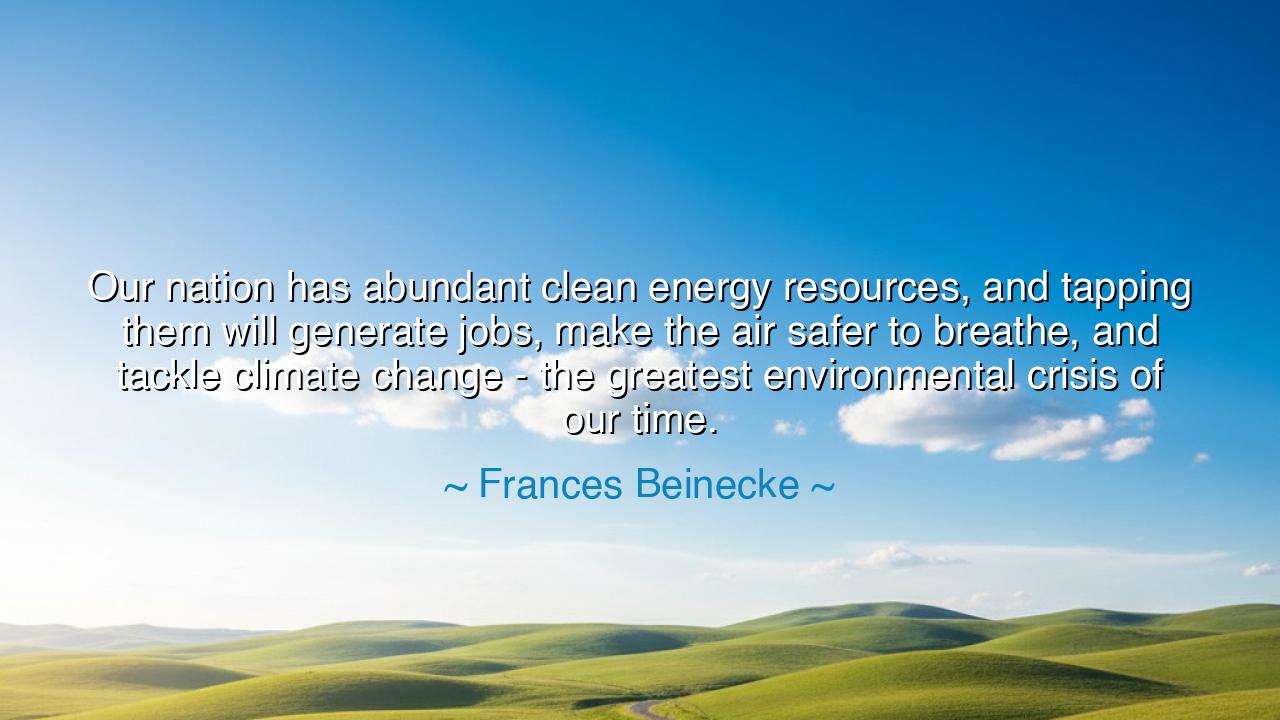
Our nation has abundant clean energy resources, and tapping them
Our nation has abundant clean energy resources, and tapping them will generate jobs, make the air safer to breathe, and tackle climate change - the greatest environmental crisis of our time.






Hear the ringing words of Frances Beinecke, filled with urgency and hope: “Our nation has abundant clean energy resources, and tapping them will generate jobs, make the air safer to breathe, and tackle climate change—the greatest environmental crisis of our time.” In this proclamation, she calls not only to governments and leaders, but to every citizen. Her words remind us that the fate of nations and the fate of the earth are bound together, and that within the very land we walk lies the power to preserve our future or to destroy it.
The essence of her teaching lies in the promise of clean energy. For centuries, mankind has drawn its power from coal, oil, and gas, tearing wealth from the earth but leaving behind smoke, poison, and fire. These fuels built empires and drove progress, yet they also wounded the sky and scorched the seas. Beinecke proclaims that we need not remain bound to this destructive inheritance, for the sun shines, the wind blows, the waters flow, and the earth herself gives energy without harm. In abundance lie the resources of renewal, if only we have the courage to seize them.
Her words also reveal a deeper wisdom: that clean energy is not a sacrifice, but a source of prosperity. To tap the winds and the sun is to open new paths of labor, new industries, and new livelihoods. Where once smoke poured from factories, now turbines may turn and panels may glisten, offering work to builders, engineers, farmers, and craftsmen. Thus, she ties the fate of the worker to the health of the earth, showing that what heals the planet may also feed the family. Jobs and justice may rise together if wisdom guides our hand.
History itself provides witness. In the oil shocks of the 1970s, nations that relied wholly upon fossil fuels staggered under the weight of scarcity and political strife. Yet those who turned toward renewables, like Denmark with its wind power, discovered resilience and strength. What was once seen as a fragile experiment became the foundation of national pride and independence. This story reveals the truth in Beinecke’s vision: that to embrace clean energy is not weakness but power, not retreat but progress.
Yet her words burn brightest when she names climate change as “the greatest environmental crisis of our time.” For indeed, it is the gathering storm that overshadows all others. Rising seas threaten to swallow coasts, storms grow fiercer, droughts more cruel, and wildfires more relentless. This crisis is no distant threat but a present reality, already reshaping lives across the world. Beinecke reminds us that we possess both the tools and the knowledge to fight it—but the window of action is narrow, and hesitation is betrayal of future generations.
The lesson is clear: the path forward lies not in clinging to the past but in embracing the abundance of the future. We must demand of our leaders that they invest in renewable energy, that they end subsidies for destruction, and that they safeguard the air, the water, and the climate upon which all life depends. And we, as individuals, must also choose wisely: in what we buy, in how we live, in the voices we raise to protect the earth.
Therefore, children of tomorrow, take Frances Beinecke’s words as both a warning and a promise. The resources of renewal are abundant; the chance to act is before us. If we choose to embrace them, we may create a world where work is plentiful, the air is pure, and the earth remains livable for generations yet unborn. But if we delay, the crisis will consume us, and no wealth will buy back what is lost. Let us act, boldly and without fear, knowing that in the choice of clean energy we choose not only prosperity but survival itself.






AAdministratorAdministrator
Welcome, honored guests. Please leave a comment, we will respond soon